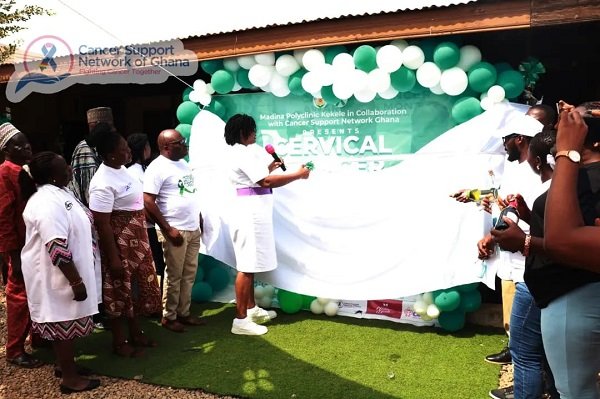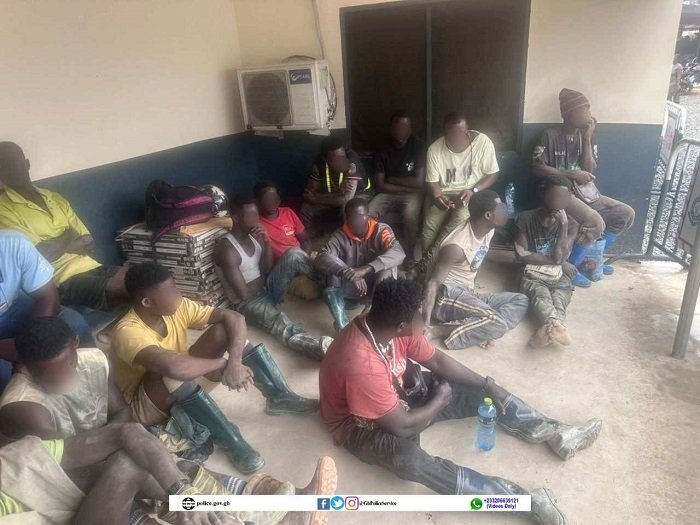News
Women asked to screen regularly as cervical cancer claims more lives

●Mrs Zenabu Addo (middle) cuttingthe tape to launch the programme
Described as deadly, devastating and leaving families in misery, cervical cancer has claimed many lives in Ghana than those recorded by road accidents and maternal deaths.
Data from the Human Papilloma Virus (HPV) Information Centre in Ghana has revealed that about 3,151 new cases of cervical cancer are diagnosed annually, and the disease is ranked the second most frequent cancers among women.
In 2019, alone, the disease claimed a total of 2,103 lives in the country.
The District Deputy Director of Nursing Services, Mrs Zenabu Addo who was speaking at the launch of this year’s Cervical Cancer Awareness Month at the Madina Polyclinic, Kekele in Accra, said Cervical Cancer was caused by a sexually transmitted virus called HPV.
The programme which was organised by the Madina Polyclinic in collaboration with the Cancer Support Network Ghana was themed, “Early Detection is Key.”
Mrs Zenabu Addo enumerated the risk factors as engaging in early sex before attaining the age of 20, smoking, having multiple sexual partners at different times and one’s family history among others.
Mr Blaise Ackom, a Cervical Cancer Ambassador in a keynote address emphasised the point that women should embrace regular screening for early detection of the disease and subsequent treatment.
He said the key preventable method was for young ladies to abstain from sex and that women should take advantage of the awareness creation month and have themselves screened at a lower cost.
He noted that there was no cure for cervical cancer anywhere apart from the hospital.
Mr Ackom warned against smoking, especially shisha which he said was more dangerous than smoking many sticks of cigarette and lamented that the rate at which the youth were smoking shisha was alarming.
He called on husbands to support their wives and female children to screen regularly and parents in general to take good care of their children so that they would not fall prey to bad behaviours in society.
He advised women to study their bodies well in order to identify abnormalities and promptly report issues of post-coital bleeding.
The Cervical Cancer Ambassador appealed to the government to include free screening of the disease in the National Health Insurance Scheme.
Ms Rosetta Ntriwaa Aboagye, a Midwife at the LekMA Polyclinic at Teshie Tsuibleoo, observed that since the cervix played essential roles in the lives of women, there was the need to cherish it and ensure that it was well maintained.
“Since this is the only cancer which is preventable, why do we wait unnecessarily without embracing the preventable means for it to destroy us,” she asked.
Ms Afwoa Mireku Ampomah, also a Cervical Cancer Ambassador, called on women to take control of their lives, boost their immune system and avail themselves of vaccination.
By Raymond Kyekye
News
Anti-galamsey Operations: 23 suspects arrested, 64 Chanfang machines disabled

The Ghana Police Service has deepened its crackdown on illegal mining through targeted, intelligence-led operations in the Western Region, resulting in the arrest of 23 suspects and the disabling and retrieval of various mining equipment.
In the Wassa Akropong District, police arrested twenty-three (23) suspects during operations along the Wassa Akropong–Japa–Dadieso road. The team also extended operations to the Obeng Mining Group site at Wassa Japa, where sixty-four (64) changfan machines were disabled.
At Wassa Dominase, officers responded to intelligence on illegal mining near the Goil and Energy Oil filling stations along the Agona Amenfi–Gyedua Kesse Junction road. Seven (7) changfan machines and washing boards were disabled. Three (3) water pumping machines and one (1) pickaxe were retrieved.
In a separate operation in Asankrangwa, police acted on information about illegal mining near the 1D1F building along the Asankra Saah–Asankra Kwabeng road, retrieving three (3) water pumping machines and four (4) motorbikes.
All suspects are in custody assisting with ongoing investigations.
News
Govt urged to provide safe, supportive environment for menstruating girls

The government has been urged to take urgent steps toward providing a safe and supportive environment for menstruating girls to ensure proper personal hygiene and promote school attendance.
Sarah Nkansah Boateng, a midwife at the Eastern Regional Hospital made the call during a forum organised as part of activities to observe Menstrual Hygiene Day celebration in the New Juaben North Municipality of the Eastern Region.
The event was held under the theme “Together for a Period-Friendly World.”
She noted that many girls skip school during their menstrual periods due to a lack of access to sanitary products and appropriate spaces to change them.
“The basic necessities for these girls are not being provided; creating a safe and enabling environment is crucial,” Madam Boateng emphasized.
She called on school authorities and policymakers to prioritise the construction of hygienic and private changing spaces in schools.
She further appealed for a collective effort to address menstrual health challenges affecting girls in the community.
The New Juaben North Municipal Director of Health Services, Nana Yaa Konadu, also highlighted her office’s initiatives in both school-based and community clinics to educate young girls on menstrual hygiene.
She stressed the health implications of poor menstrual hygiene, saying, “When girls lack access to sanitary pads and a clean environment, it can negatively impact their reproductive health.”
Madam Konadu warned that the absence of menstrual hygiene facilities and products left some girls vulnerable to exploitation, increasing the risk of teenage pregnancy.
The Municipal Chief Executive for New Juaben North, Mr Samuel Adongo, described menstruation as a natural biological process and not a taboo or burden.
He expressed concern over the poor state of sanitation facilities in schools.
“I have visited almost all public schools in the municipality, and none has a proper, standard toilet facility suitable for girls,” he stated.
Mr Adongo assured that the assembly would work to create an enabling environment to reduce school absenteeism related to menstruation.
“Too many girls are missing school because of their menstrual cycle, and this is unacceptable,” he added.
From Ama Tekyiwaa Ampadu Agyeman, Koforidua






